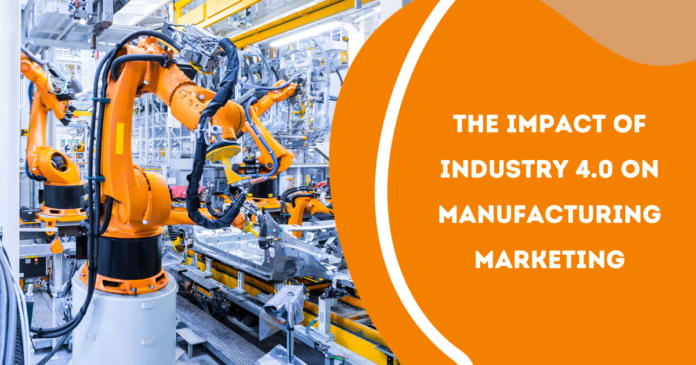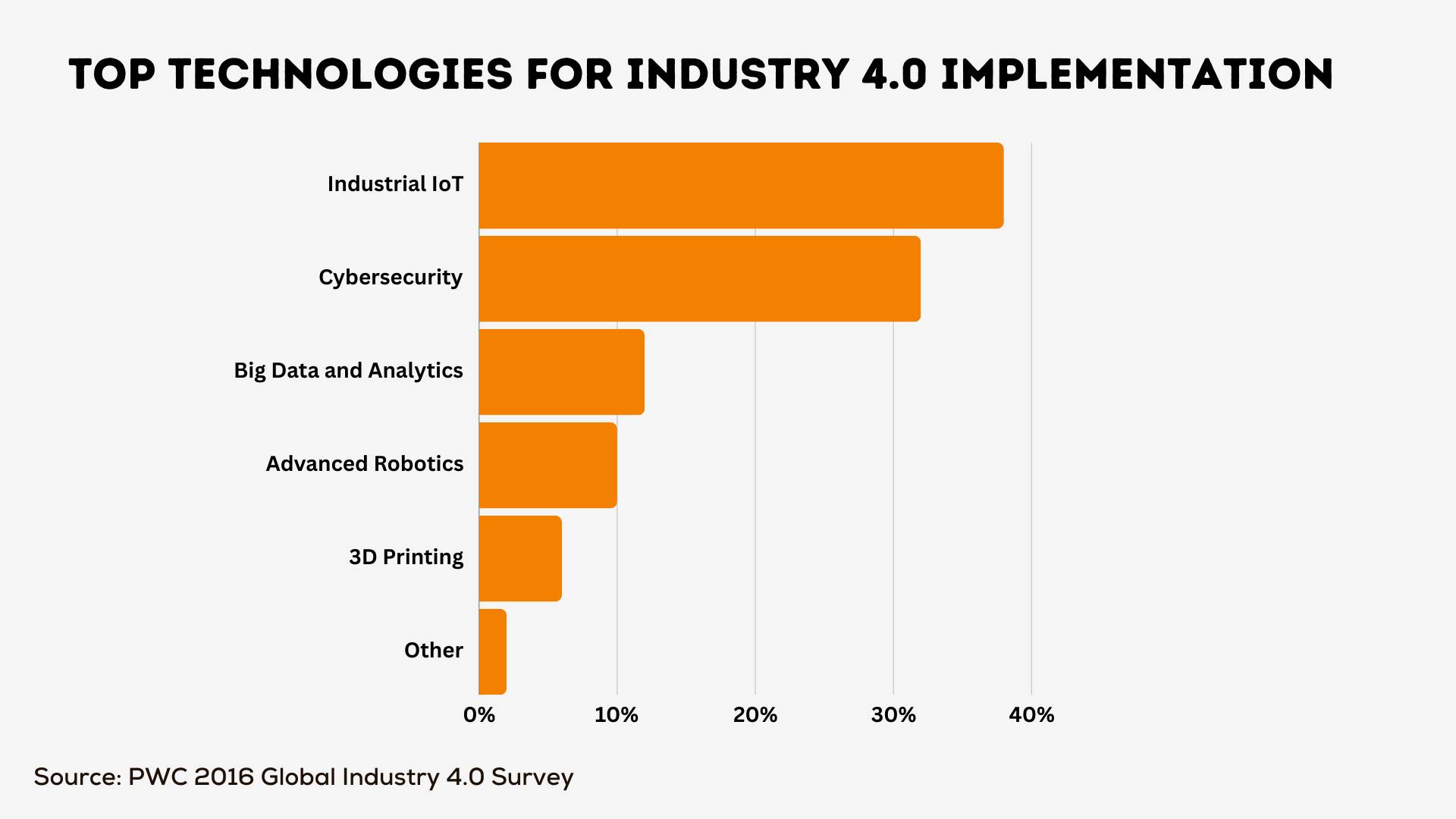Industry 4.0 represents some big technology shifts that are reshaping manufacturing in neat ways. Initially conceived in Germany as an idea to incorporate more computer technology into factories, Industry 4.0 is now assisting companies worldwide in manufacturing and selling products more intelligently.
Marketing leaders must pay attention to seize the opportunities created by this shift while also addressing some new challenges.
Integration of Digital Technologies in Manufacturing Marketing
Smart factories and their impact on production efficiency
One big change is smarter factories where machines talk to each other. They use things like big data, Internet of Things sensors, and cool robots to build products.
This new setup enables marketing teams to respond more quickly to the evolving preferences of buyers. It also makes producing goods more flexible, efficient and transparent. This matters a ton today when peoples’ wishes change quickly.
Data-driven decision-making in marketing strategies
Advanced data analytics also let teams predict trends better. This helps with setting prices, knowing future demand, and sending targeted ads.
McKinsey says data-driven companies earn higher profits year-over-year – six times more than others! As what buyers crave shifts faster than ever, manufacturing marketing agencies have to use real-time data to keep up.
Automation and robotics in manufacturing processes
Smart robotics will also change factory workflows a lot. This allows making personalized stuff affordably while cutting costs and improving quality too. This innovative setup empowers marketing teams to respond promptly to the changing preferences of buyers.
Customer-Centric Approach in Industry 4.0
Data Allows More Personalized Products and Buying
Indeed, by tapping into customer data, manufacturers can move towards offering personalized products and shopping experiences. This matters now as 44% of consumers gravitate to brands that customize things for them, says Segment.
To personalize correctly, teams should use analytics and CRM systems. These provide 360-views of what each person prefers, does, and may purchase. Targeted campaigns can then guide everyone along their unique buyer’s journey.
To capitalize on this trend, teams should utilize analytics and customer relationship management platforms to gain a comprehensive understanding of preferences, behaviors, and buying predictors. Targeted outreach campaigns can then nurture each contact along their unique buyer’s journey.
Customization of Products Based on What Customers Want
Also, more niche communities and influencers make tailored products for specialized uses or lifestyles more popular.
In fact, 71% of global shoppers say they’ll pay more for customized stuff, says Deloitte. Using Industry 4.0 tools like fast prototyping and flexible robots, factories can cost-effectively develop variations on demand.
Enhanced Customer Engagement Using Internet-Connected Devices
Adding internet connectivity also allows factories to build smart features into finished goods. This gives customers better, smoother experiences. This makes good service key for long-term loyalty and standing out from competitors. Getting user feedback lets agile teams steadily improve too.
Supply Chain Optimization
Real-time tracking and monitoring of the supply chain
To meet shifting customer expectations, manufacturers must also use sensors, blockchain, and other digital tools to see their whole supply network.
Spotting bottlenecks faster helps marketing teams avoid shortages that erode trust and extra costs.
Predictive maintenance for improved reliability
New predictive tech also lets supply chain equipment alert operators about fixes needed before breakdowns happen.
By minimizing disruptions, factories protect output volumes and on-time delivery for better reliability.
Blockchain technology for transparency and traceability
Blockchain also has big potential for showing customers ethical sourcing and supply details. For food and pharmaceuticals, Capgemini says over 89% of early adopters have achieved transparency gains.
By tracing goods end-to-end across places, marketers can share real origin stories associated with finished offerings.
Impact on Traditional Marketing Channels
Shift from traditional advertising to digital marketing
As audiences consume information mostly online now, marketing blends more with designing good customer experiences. Statista projects global digital ad spend hitting $518 billion by 2024, fast outpacing traditional outlets.
For manufacturers, owned platforms are already vital for cost-effective lead nurturing and community building as sales journeys get more complex. Creative, interactive formats are now a must.
Utilizing social media and online platforms for brand visibility
With 3.96 billion global social media users per Hootsuite, staying active on these networks is essential for visibility as peer groups migrate online.
By sharing valuable content, factories can leverage followers to organically spread messages and humanize brands with behind-the-scenes peeks. As algorithms shift, marketers must stay nimble in channel selections and community growth.
Challenges and opportunities in adapting to digital transformation.
While many organizations still rely heavily on conventional tactics, building competencies in areas like automation, virtual sales, and digital ecosystem integration will future-proof teams for the exponential pace of change within Industry 4.0. Takeaways from brands pioneering these models provide playbooks for others to adapt.
Frequently Asked Questions
How can small factories start using Industry 4.0 affordably?
Many starter projects now use plug-and-play cloud tools. These need less upfront investment than custom automation. Exploring managed services for machine learning, sensors or cybersecurity can provide good beginner toolkits without big disruptions.
What cybersecurity issues happen with Industry 4.0, and how do we address them?
As smart factory systems link more machines, they create more weak spots hackers could attack. So securing connections is crucial as this infrastructure scales up. Tactics like network splitting, strict logins, encryption and staff training help beat back external threats.
How can we smoothly train teams on Industry 4.0 when people often resist change?
Change management is key when bringing in advanced technologies that alter how employees work. Things like group collaboration sessions, celebrating progress milestones, and transparent communication of goals and timelines help organizations shift to Industry 4.0 without frustrating workers. Highlighting opportunities for staff growth and career mobility also eases transitions.
Bottom Line
Industry 4.0 marks a crucial moment for leaders in the field of manufacturing marketing. Leveraging automation, IoT sensors, blockchain, and big data unlocks massive opportunities to boost productivity, customization and customer engagement.
Although adapting to modern tactics and workflows poses challenges, successful brands serve as examples, illustrating the rewards for those who swiftly embrace change. Ultimately, Industry 4.0 will separate future-focused manufacturers from those sticking to outdated models – making participation vital for long-term resilience.






